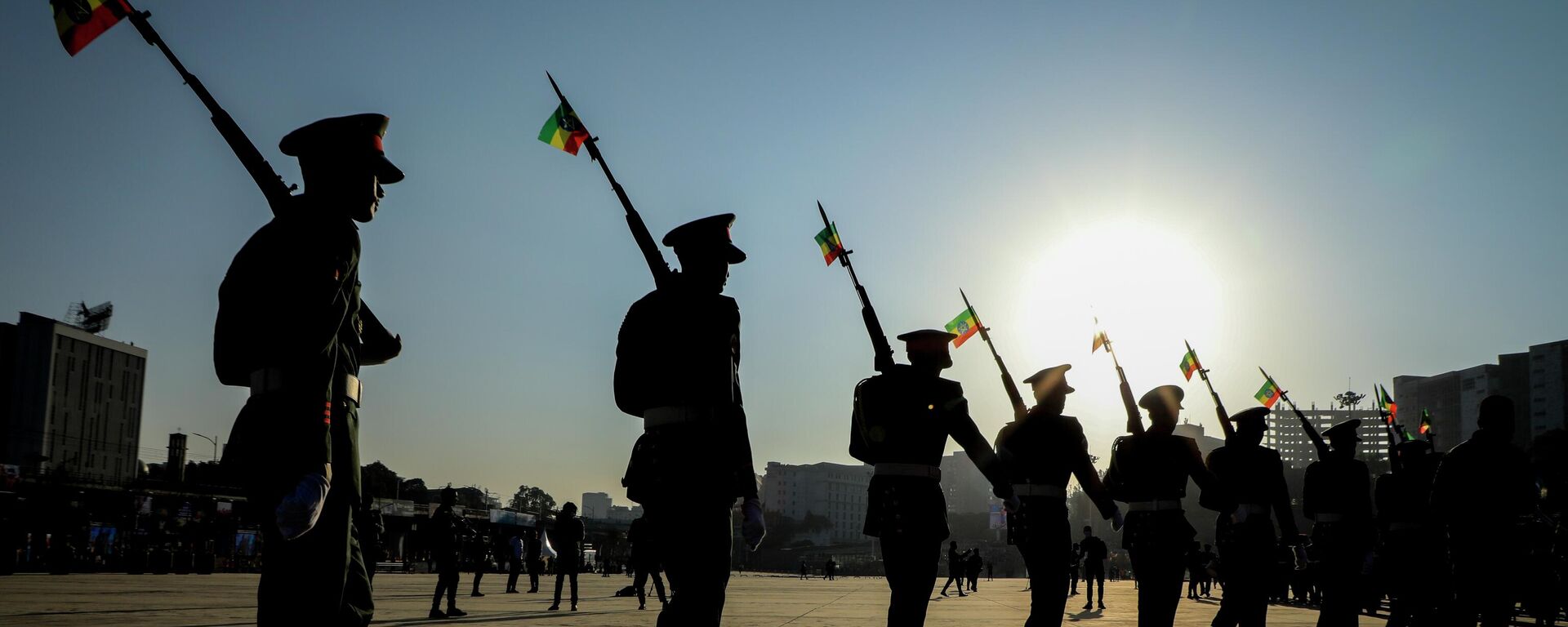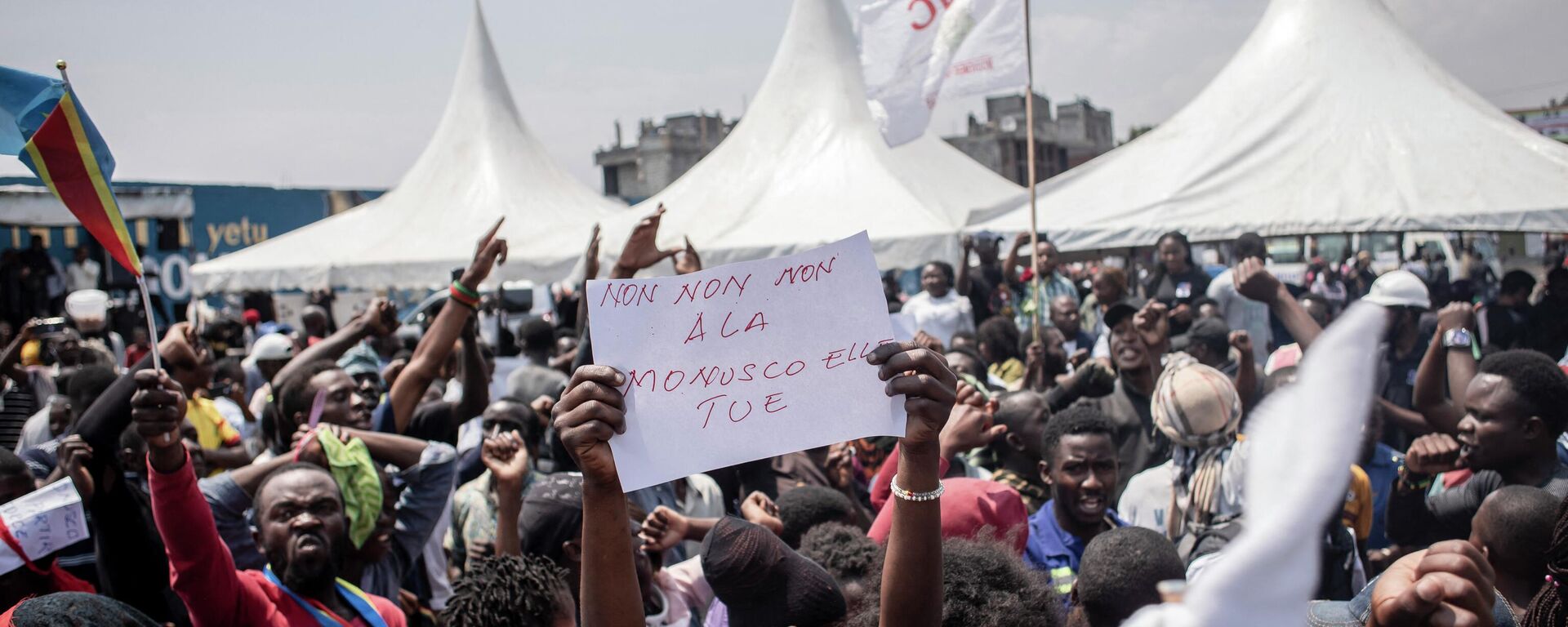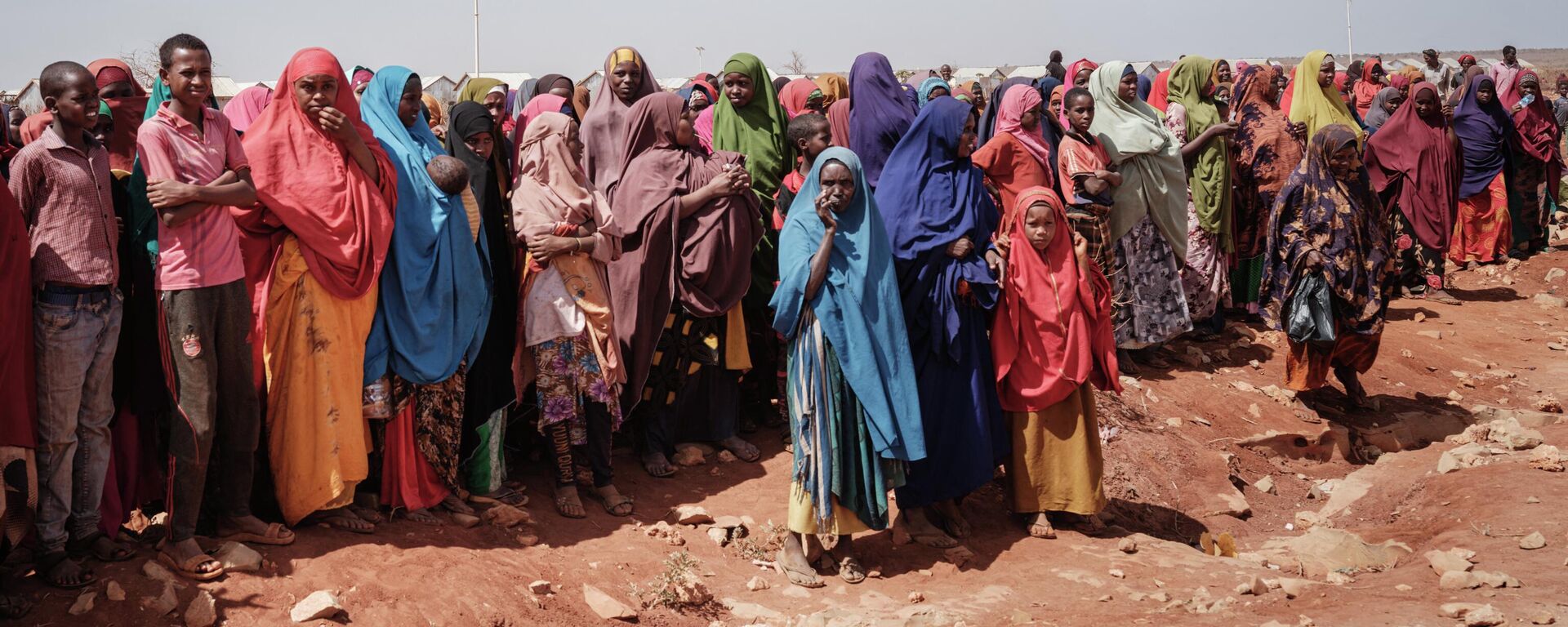https://sputnikglobe.com/20221018/as-un-backs-african-unions-ethiopia-ceasefire-call-could-a-peacekeeping-mission-help-1102017232.html
As UN Backs African Union’s Ethiopia Ceasefire Call, Could a Peacekeeping Mission Help?
As UN Backs African Union’s Ethiopia Ceasefire Call, Could a Peacekeeping Mission Help?
Sputnik International
Northern Ethiopia was thrust into a deadly civil conflict between federal government forces and Tigray People’s Liberation Front (TPLF) militants in November... 18.10.2022, Sputnik International
2022-10-18T16:16+0000
2022-10-18T16:16+0000
2022-11-14T12:47+0000
africa
tplf (tigray people's liberation front)
ethiopia
african union (au)
conflict resolution
the united nations (un)
east africa
https://cdn1.img.sputnikglobe.com/img/07e6/0a/12/1102016846_0:67:584:396_1920x0_80_0_0_81c831e5e7af67d5b5de836a79361c2f.jpg
The United Nations fully supports the African Union’s calls for an immediate halt to the conflict in northern Ethiopia, Secretary-General Antonio Guterres has announced.“Hostilities in the Tigray region of Ethiopia must end now. There is no military solution,” he added.Guterres also pleaded with all parties to the conflict to stick to their obligations under international humanitarian law amid widespread allegations of indiscriminate attacks and potential war crimes.“The Chairperson urges the Parties to recommit to dialogue as per their agreement to direct talks to be convened in South Africa by a high-level team led by the AU High Representative for the Horn of Africa, and supported by the international community,” the pan-continental bloc said in a press statement Saturday.Could UN Peacekeeping Mission Help to Halt the Conflict?Over the past 60 years, the United Nations has amassed a wealth of experience in regulating civil and state-to-state conflicts on the African continent using peacekeeping forces, starting with the UN Operation in the Congo in 1960.These operations included a mission in Ethiopia and Eritrea between 2000 and 2008 tasked with monitoring a ceasefire following the 1998-2000 border conflict between the two nations. The 1,900 person-strong mission, which included a contingent of 1,500 Indian Army troops, proved successful in stemming violence while it lasted.However, sporadic clashes resumed after the UN’s withdrawal in 2018 at Eritrea’s request. In 2018, then-freshly elected Ethiopian Prime Minister Abiy Ahmed moved to normalize relations between Ethiopia and Eritrea, with the olive branch proving so successful that the two nations joined forces against the TPLF when the Tigray crisis began in late 2020.Ethiopia itself had a long history of cooperation with UN peacekeeping operations, contributing nearly 1,500 troops and officers to ongoing missions, and regularly appearing in the top five of countries by total peacekeeper deployments alongside India, Bangladesh, Nepal, and Rwanda. Unfortunately, Addis Ababa’s eagerness in assisting its neighbors through UN peacekeeping operations has had unintended consequences, with recent media reports revealing that hundreds of ethnic Tigrayans who previously served as peacekeepers are now participants in the Tigray crisis.Focus on AfricaSix of the UN’s 12 ongoing peacekeeping missions around the world are in Africa, with operations in the Democratic Republic of the Congo, the Central African Republic, Mali, and South Sudan constituting its largest overall missions by peacekeeper numbers and funding. Operations are also underway in Abyei – a volatile border area between Sudan and South Sudan, and Western Sahara – a former Spanish colony which has faced half a century of strife between the self-proclaimed Sahrawi Arab Democratic Republic and Morocco, which claims the territory for itself.The UN dubs its DRC, CAR, and Mali missions as “stabilization” operations aimed at maintaining social order, protecting civilians, facilitating humanitarian assistance, and enabling national political dialogue and reconciliation.Although the UN’s peacekeeping missions received praise and recognition during the Cold War – when the superpowers and their respective blocs watched one another like hawks to prevent the tool from being abused by either side, the jury is still out on the effectiveness of modern operations. Critics have pointed to the massive budgets laid out for the operations (including $6.45 billion for the 2022-2023 fiscal year) limitations on peacekeepers’ ability to get involved in complicated ethnic, social, and economic disputes, and story after story of sexual abuse, human trafficking, and other crimes by peacekeeping personnel. Combined, these criticisms have put a bad taste in some Africans’ mouths regarding the effectiveness of the UN’s boots-on-the-ground operations.Praise for UN peacekeeping in the era of American unipolarity after 1991 from US officials and leading neoconservative think tanks such as the Council of Foreign Relations has prompted additional concerns, given Washington’s propensity to try to use the UN as a conduit for its own foreign policy objectives and goals.Alternatives to Boots on the GroundBesides peacekeeping, there are a number of other ways the UN can help facilitate peace, whether in the Tigray conflict or other areas. The organization can, for example, broker talks between the conflicting parties, as it recently did in Libya, Sudan, and Yemen. The UN also jointly brokered the Russia-Ukraine grain deal with Turkey in July, allowing for Ukrainian foodstuffs to be exported by sea through Russian-controlled areas (although Moscow has repeatedly questioned the effectiveness of that agreement in getting food to the African nations which need it most).Perhaps more than anything, the UN would do best to heed the principle of “African solutions to African problems” - laid down by eminent Ghanaian economist George Ayittey in the wake of the disastrous US military intervention in Somalia in the 1990s. Under this principle, the African Union should take the lead on any initiative to stop civil and state-to-state conflicts on the African continent, with the UN playing only a supporting role, as it has done in the Tigray crisis to date.
https://sputnikglobe.com/20221005/ethiopian-government-accepts-african-unions-offer-for-peace-talks-with-tigray-rebels-1101524411.html
https://sputnikglobe.com/20221001/un-ready--willing-to-work-with-dr-congos-govt-on-peacekeepers-pullout-amid-volatile-security-1101405073.html
https://sputnikglobe.com/20221014/how-west-betrays-horn-of-africa--sahels-starving-people-1101855831.html
africa
ethiopia
east africa
Sputnik International
feedback@sputniknews.com
+74956456601
MIA „Rossiya Segodnya“
2022
News
en_EN
Sputnik International
feedback@sputniknews.com
+74956456601
MIA „Rossiya Segodnya“
Sputnik International
feedback@sputniknews.com
+74956456601
MIA „Rossiya Segodnya“
tplf (tigray people's liberation front), ethiopia, african union (au), conflict resolution, the united nations (un), east africa
tplf (tigray people's liberation front), ethiopia, african union (au), conflict resolution, the united nations (un), east africa
As UN Backs African Union’s Ethiopia Ceasefire Call, Could a Peacekeeping Mission Help?
16:16 GMT 18.10.2022 (Updated: 12:47 GMT 14.11.2022) Northern Ethiopia was thrust into a deadly civil conflict between federal government forces and Tigray People’s Liberation Front (TPLF) militants in November 2020, when Addis Ababa launched a counter-terrorism operation in the wake of a TPLF attack on a military base. The crisis has culminated in a large-scale humanitarian disaster.
The United Nations fully supports the African Union’s calls for an immediate halt to the conflict in northern Ethiopia, Secretary-General Antonio Guterres has announced.
“The United Nations is ready to support the African Union in every way possible to end this nightmare for the Ethiopian people. We need the urgent resumption of talks towards an effective, lasting, political settlement,” Guterres said, speaking to reporters on Monday.
“Hostilities in the Tigray region of Ethiopia must end now. There is no military solution,” he added.
Guterres also pleaded with all parties to the conflict to stick to their obligations under international humanitarian law amid widespread allegations of indiscriminate attacks and potential war crimes.
The secretary-general’s comments came on the heels of a statement by African Union Commission Chairman Moussa Faki Mahamat calling for an “immediate, unconditional ceasefire and the resumption of humanitarian services” in the conflict-torn Ethiopian region.
“The Chairperson urges the Parties to recommit to dialogue as per their agreement to direct talks to be convened in South Africa by a high-level team led by the AU High Representative for the Horn of Africa, and supported by the international community,” the pan-continental bloc said in a press statement Saturday.
Could UN Peacekeeping Mission Help to Halt the Conflict?
Over the past 60 years, the United Nations has amassed a wealth of experience in regulating civil and state-to-state conflicts on the African continent using peacekeeping forces, starting with the UN Operation in the Congo in 1960.
These operations included a mission in Ethiopia and Eritrea between 2000 and 2008 tasked with monitoring a ceasefire following the 1998-2000 border conflict between the two nations. The 1,900 person-strong mission, which included a contingent of 1,500 Indian Army troops, proved successful in stemming violence while it lasted.
However, sporadic clashes resumed after the UN’s withdrawal in 2018 at Eritrea’s request. In 2018, then-freshly elected Ethiopian Prime Minister Abiy Ahmed moved to normalize relations between Ethiopia and Eritrea, with the olive branch proving so successful that the two nations joined forces against the TPLF when the Tigray crisis began in late 2020.
Ethiopia itself had a long history of cooperation with UN peacekeeping operations, contributing
nearly 1,500 troops and officers to ongoing missions, and regularly appearing in the top five of countries by total peacekeeper deployments alongside India, Bangladesh, Nepal, and Rwanda. Unfortunately, Addis Ababa’s eagerness in assisting its neighbors through UN peacekeeping operations has had unintended consequences, with recent media reports revealing that hundreds of ethnic Tigrayans who previously served as peacekeepers
are now participants in the Tigray crisis.
5 October 2022, 12:19 GMT
Six of the UN’s 12 ongoing peacekeeping missions around the world are in Africa, with operations in the Democratic Republic of the Congo, the Central African Republic, Mali, and South Sudan constituting its largest overall missions by peacekeeper numbers and funding. Operations are also underway in Abyei – a volatile border area between Sudan and South Sudan, and Western Sahara – a former Spanish colony which has faced half a century of strife between the self-proclaimed Sahrawi Arab Democratic Republic and Morocco, which claims the territory for itself.
The UN dubs its DRC, CAR, and Mali missions as
“stabilization” operations aimed at maintaining social order, protecting civilians, facilitating humanitarian assistance, and
enabling national political dialogue and reconciliation.
Although the UN’s peacekeeping missions received praise and recognition during the Cold War – when the superpowers and their respective blocs watched one another like hawks to prevent the tool from being abused by either side, the jury is still out on the effectiveness of modern operations. Critics have pointed to the massive budgets laid out for the operations (including $6.45 billion for the 2022-2023 fiscal year) limitations on peacekeepers’ ability to get involved in complicated ethnic, social, and economic disputes, and
story after story of
sexual abuse, human trafficking, and
other crimes by peacekeeping personnel. Combined, these criticisms have put a bad taste in some Africans’ mouths regarding the effectiveness of the UN’s boots-on-the-ground operations.
Praise for UN peacekeeping in the era of American unipolarity after 1991
from US officials and leading neoconservative think tanks such as the
Council of Foreign Relations has prompted additional concerns, given Washington’s propensity to try to use the UN as a conduit for its own foreign policy objectives and goals.

1 October 2022, 08:47 GMT
Alternatives to Boots on the Ground
Besides peacekeeping, there are a number of other ways the UN can help facilitate peace, whether in the Tigray conflict or other areas. The organization can, for example, broker talks between the conflicting parties, as it recently did in
Libya,
Sudan, and
Yemen. The UN also jointly brokered the Russia-Ukraine grain deal with Turkey in July, allowing for Ukrainian foodstuffs to be exported by sea through Russian-controlled areas (although Moscow
has repeatedly questioned the effectiveness of that agreement in getting food to the African nations which need it most).
Perhaps more than anything, the UN would do best to heed the principle of
“African solutions to African problems” - laid down by eminent Ghanaian economist George Ayittey in the wake of the disastrous US military intervention in Somalia in the 1990s. Under this principle, the African Union should take the lead on any initiative to stop civil and state-to-state conflicts on the African continent, with the UN playing only a supporting role, as it has done in the Tigray crisis to date.

14 October 2022, 15:31 GMT





